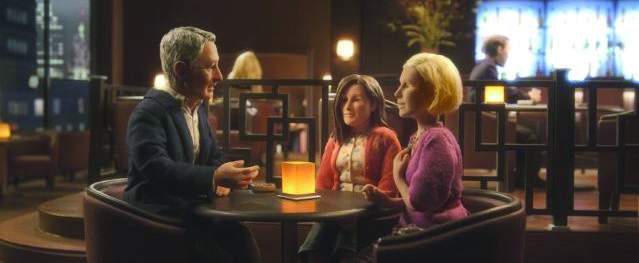By Richard von Busack
A straight-up Kickstarter-funded anomaly, Anomalisa, by Charlie Kaufman (with co-director Duke Johnson) is touching but transitory. In Cincinnati in 2005, Michael (voiced by David Thewlis) comes to the Hotel Fregoli to address a convention; he’s the author of the bestselling customer-service book How May I Help You Help Them? This expert in the technology of smiling self-effacement is, in a word, miserable—“I think I have a psychological problem,” he confesses to a woman whom he dropped hard 10 years previously for no reason. After he has an anxiety attack that wakes up some of the guests, Michael goes drinking in the hotel bar with two female fans—a big and bawdy blonde Emily and her shy pal Lisa, voiced by a very endearing Jennifer Jason Leigh.
That Michael and Lisa will end up together is plain—Michael needs her, and she is longing to be needed. She has one more attractive quality: Her salient feature is that she sounds different than anyone else. (All voices in the film that aren’t performed by Leigh and Thewlis are done by Tom Noonan, whether the characters are male or female). A clue: The Hotel Fregoli is named after the psychiatric term a “Fregoli Delusion”—the belief that every stranger you encounter is actually someone you know, in disguise.
There has been some fretting on the Internet about why a movie lacking in cartoony squash and stretch was done in the animated format. Animation usually equals exaggeration, but the lively art can be used for the reverse: As a way of removing nuance and facial expression, leaving the viewer with more questions to solve. Is Michael’s neurosis self-delusion? Is he just one more prowling married man exaggerating his melancholy, in hopes of attracting girls? Are his terrors and nightmares reflections of his guilt for straying from his wife?
But will you really want to find out? There are passages in Anomalisa as adroit as the best of Kaufman’s daydreamy scripts, such as Adaptation, and Being John Malkovich. The delicacy of touch and focus is visible throughout. Odd that one of the most tender lovemaking scenes of the year involved puppets—seen in their anatomically correct, awkward coupling a decent distance away from the bed.
But as per Lost in Translation, this is a story that might be more keen to a celebrity than a film audience. Michael’s problems as an Englishman in a too aggressively friendly, too insanely cheerful America are, in essence, a famous person’s complaints about the price of fame. It’s the old story of flinching through all the unwanted attention, like raw oysters shivering under the lemon juice.






